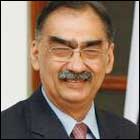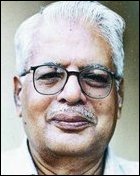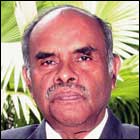Habitual detraction of due justice to Eezham Tamils continues in Indian media
[TamilNet, Friday, 19 July 2013, 04:51 GMT]
“In order to allay Sinhalese apprehensions, iron-clad guarantees should be provided that devolution to provinces should not lead to demand for separation,” writes V. Suryanarayan, in an opinion feature “Ethnic riddle in Sri Lanka,” appeared in The New Indian Express on Wednesday. “The Achenese model should be of relevance because like the Sinhalese, the Javanese are also opposed to federalism. The special autonomy status to Acheh, it must be underlined, is within the constitutional framework of a unitary Indonesia,” he further writes. Whatever that has happened or continue to happen, Eezham Tamils should never get independence and the Sinhalese should be appeased at any cost, even in their opposition to federalism, is the thrust of the opinion, on which the impunity of genocidal Sri Lanka is firmly anchored, responds TamilNet political commentator in Colombo.
Riddles are told when there are no answers or when the questioner already knows a ‘surprising’ answer.
The question in the island is not new to humanity and the righteous answer is obvious in the pages of history, unless academics and media obliged serve and shield the criminality in the course of the Establishments think of transferring their own riddle on to the question.
If it is really a riddle with a ‘surprising’ answer and if what Suryanarayan has written is that answer, then it is neither a riddle nor that answer is surprising, because such a stand of New Delhi and Suryanarayan, denying independence to Eezham Tamils, appeasing with the ‘apprehensions’ and ‘oppositions’ of the genocidal Sinhala State to any extent for returns reaped by Indian imperialism from time to time, and thus setting the course for the annihilation of the nation of Eezham Tamils as the ‘lasting solution’, is well known for decades.
* * *
“In order to allay Sinhalese apprehensions, iron-clad guarantees should be provided that devolution to provinces should not lead to demand for separation,” writes V. Suryanarayan, in an opinion feature “Ethnic riddle in Sri Lanka,” appeared in The New Indian Express on Wednesday. “The Achenese model should be of relevance because like the Sinhalese, the Javanese are also opposed to federalism. The special autonomy status to Acheh, it must be underlined, is within the constitutional framework of a unitary Indonesia,” he further writes. Whatever that has happened or continue to happen, Eezham Tamils should never get independence and the Sinhalese should be appeased at any cost, even in their opposition to federalism, is the thrust of the opinion, on which the impunity of genocidal Sri Lanka is firmly anchored, responds TamilNet political commentator in Colombo.
Riddles are told when there are no answers or when the questioner already knows a ‘surprising’ answer.
The question in the island is not new to humanity and the righteous answer is obvious in the pages of history, unless academics and media obliged serve and shield the criminality in the course of the Establishments think of transferring their own riddle on to the question.
If it is really a riddle with a ‘surprising’ answer and if what Suryanarayan has written is that answer, then it is neither a riddle nor that answer is surprising, because such a stand of New Delhi and Suryanarayan, denying independence to Eezham Tamils, appeasing with the ‘apprehensions’ and ‘oppositions’ of the genocidal Sinhala State to any extent for returns reaped by Indian imperialism from time to time, and thus setting the course for the annihilation of the nation of Eezham Tamils as the ‘lasting solution’, is well known for decades.
* * *

Vivek Katju
Another one of the ilk, Vivek
Katju, a former Indian Ambassador to Afghanistan, was advising the
genocide-facing Eezham Tamils in a feature in The Hindu on 3rd July that
“On their part, minorities must shun violent approaches and understand
the concerns of the majority communities.”
Katju, a former part of the Establishment that never accepts the genocide it partnered in “this digital age,” was ostensibly sounding sane in telling leaders of the digital age controlling destinies of peoples and countries, not to be guided by historical memory and battles lost and won.
“The 13th Amendment is the cornerstone of the position of the overwhelming majority of the Tamil political class,” Katju writing in The Hindu nullified the ballot of Tamils in the last voting free to take up the topic in the island in 1977, referenda in the diaspora in 2009-2010, and has detracted the international responsibility of conducting a referendum, for it will go out of the exclusive hands of his Establishment.
In speaking to Rajapaksa, Katju was looking forward that “the communication channels which have worked successfully to diffuse situations in the past now need to operate urgently.”
Political observers say that five days after The Hindu feature, Shiv Shankar Menon must have achieved it by bartering the current Tamil issues for signing a Maritime Security Pact with Colombo and Male. Perhaps, if the past communication channels like Shiv Shankar Menon and M.K. Narayanan are not enough, Katju could urge Sri Lanka Ratna Ram to take it up, diplomatic circles in Colombo were commenting.
Vivek Katju was in the BJP-RSS-Shiv Sena team that recently came to Colombo and Jaffna as guests of Rajapaksa.
* * *
Katju, a former part of the Establishment that never accepts the genocide it partnered in “this digital age,” was ostensibly sounding sane in telling leaders of the digital age controlling destinies of peoples and countries, not to be guided by historical memory and battles lost and won.
“The 13th Amendment is the cornerstone of the position of the overwhelming majority of the Tamil political class,” Katju writing in The Hindu nullified the ballot of Tamils in the last voting free to take up the topic in the island in 1977, referenda in the diaspora in 2009-2010, and has detracted the international responsibility of conducting a referendum, for it will go out of the exclusive hands of his Establishment.
In speaking to Rajapaksa, Katju was looking forward that “the communication channels which have worked successfully to diffuse situations in the past now need to operate urgently.”
Political observers say that five days after The Hindu feature, Shiv Shankar Menon must have achieved it by bartering the current Tamil issues for signing a Maritime Security Pact with Colombo and Male. Perhaps, if the past communication channels like Shiv Shankar Menon and M.K. Narayanan are not enough, Katju could urge Sri Lanka Ratna Ram to take it up, diplomatic circles in Colombo were commenting.
Vivek Katju was in the BJP-RSS-Shiv Sena team that recently came to Colombo and Jaffna as guests of Rajapaksa.
* * *

V Suryanarayan
Chennai-based V. Suryanarayan,
former Professor of South and Southeast Asian Studies, member of New
Delhi Establishment’s security advisory council and an active
contributor to the research outfits run by intelligence agencies, was
listing out the issues of Akalis, Mizos and Nagas, which according to
him, respectively found ‘natural death’, resolved through statehood and
‘progressing’ in reducing violence, through direct negotiations.
None of the examples cited by him has faced a genocidal war of international dimensions in which 30 to 40 countries, led by the USA and India participated. If Suryanarayan’s Establishment now wants to keep it in its backyard or resolve it through ‘direct negotiations’ it should have thought of it before partnering and nodding for the internationally staged genocide. It had decades of time, which it missed by following policy lines, which Suryanarayan himself and the ilk of him were advocating.
Besides, in historicity, dimensions, magnitude, and in the nature of the one to one confrontation, the question of Eezham Tamils in the island differing from any of the examples in India couldn’t have gone incomprehensive to the learned professor.
Suryanarayan now sees the Achenese model within the framework of a unitary constitution as solution. Even there he misses the difference why a Catholic East Timor had to be separated. He sees Acheh, but doesn’t see East Timor. This is of course a riddle, and the answer is ‘Nelson’s Eye’– a favourite phrase of Suryanarayan.
Even after seeing the pen and print of decades upholding the integrity of Sri Lanka bringing in genocide, if the mind is not prepared to come out with what is logical and righteous, then citing ‘Lady Macbeth’ to say ‘blood is in the hands of India’ is only shedding crocodile tears.
* * *
None of the examples cited by him has faced a genocidal war of international dimensions in which 30 to 40 countries, led by the USA and India participated. If Suryanarayan’s Establishment now wants to keep it in its backyard or resolve it through ‘direct negotiations’ it should have thought of it before partnering and nodding for the internationally staged genocide. It had decades of time, which it missed by following policy lines, which Suryanarayan himself and the ilk of him were advocating.
Besides, in historicity, dimensions, magnitude, and in the nature of the one to one confrontation, the question of Eezham Tamils in the island differing from any of the examples in India couldn’t have gone incomprehensive to the learned professor.
Suryanarayan now sees the Achenese model within the framework of a unitary constitution as solution. Even there he misses the difference why a Catholic East Timor had to be separated. He sees Acheh, but doesn’t see East Timor. This is of course a riddle, and the answer is ‘Nelson’s Eye’– a favourite phrase of Suryanarayan.
Even after seeing the pen and print of decades upholding the integrity of Sri Lanka bringing in genocide, if the mind is not prepared to come out with what is logical and righteous, then citing ‘Lady Macbeth’ to say ‘blood is in the hands of India’ is only shedding crocodile tears.
* * *

K Kesavapany
A South Indian origin former
diplomat of Singapore, K. Kesavapany, who a year ago retired as Director
of the Institute of Southeast Asian Studies in Singapore, was also
harping on the Acheh model at a gathering of ‘Sri Lankan’ Malaysians,
five years ago.
Acheh model within a unitary constitution could provide advantage for powers interested in the ethnic military of the genocidal State to keep the military unquestioned in the concerned region forever, and to easily carryout whatever ‘engineering’ they have in their mind. It is a ‘non-descript’ and un-defined model, so easier to manipulate without political debate. In other words, it is the contemporary style of confirming the colonial status of a ‘conquered’ territory.
Active agencies are now working especially in Malaysia, Singapore and in Australia, to campaign among the diaspora Tamils on the ‘virtues’ of the Acheh model.
In a parallel operation, the very same forces that have brought in Mr. Sumanthiran as nominated parliamentarian into the TNA have now brought in the candidature of Justice C.V. Wigneswaran to the Provincial Council, informed circles say.
Eezham Tamils have to accept living with Rajapaksas or any other Paksha’s (sides) brought in through ‘regime change’, accept living with the exclusive Sinhala military, accept that genocide was the right thing in the ‘digital age’, accept seeing the annihilation of their nation and territoriality and accept being ruled through agents of imperialism or agents to agents of imperialism.
There are two forces that are relatively free to make a break through: the diaspora and Tamil Nadu, if the masses there could come out challenging the ‘engineering’ at political level.
Speaking in April, C.V. Wigneswaran detracted diaspora polity and was sceptical in expecting anything positive from the feelings prevailing in Tamil Nadu.
When nearly 600,000 people, especially students took to streets in Tamil Nadu earlier this year without being initiated by political parties, and especially when they started addressing against the US-tabled Geneva resolution, Tamils all over the world saw it as a very significant move in relieving Eezham Tamils from the bondage of geopolitics that was always on the side of genocidal Sri Lanka.
Acheh model within a unitary constitution could provide advantage for powers interested in the ethnic military of the genocidal State to keep the military unquestioned in the concerned region forever, and to easily carryout whatever ‘engineering’ they have in their mind. It is a ‘non-descript’ and un-defined model, so easier to manipulate without political debate. In other words, it is the contemporary style of confirming the colonial status of a ‘conquered’ territory.
Active agencies are now working especially in Malaysia, Singapore and in Australia, to campaign among the diaspora Tamils on the ‘virtues’ of the Acheh model.
In a parallel operation, the very same forces that have brought in Mr. Sumanthiran as nominated parliamentarian into the TNA have now brought in the candidature of Justice C.V. Wigneswaran to the Provincial Council, informed circles say.
Eezham Tamils have to accept living with Rajapaksas or any other Paksha’s (sides) brought in through ‘regime change’, accept living with the exclusive Sinhala military, accept that genocide was the right thing in the ‘digital age’, accept seeing the annihilation of their nation and territoriality and accept being ruled through agents of imperialism or agents to agents of imperialism.
There are two forces that are relatively free to make a break through: the diaspora and Tamil Nadu, if the masses there could come out challenging the ‘engineering’ at political level.
Speaking in April, C.V. Wigneswaran detracted diaspora polity and was sceptical in expecting anything positive from the feelings prevailing in Tamil Nadu.
When nearly 600,000 people, especially students took to streets in Tamil Nadu earlier this year without being initiated by political parties, and especially when they started addressing against the US-tabled Geneva resolution, Tamils all over the world saw it as a very significant move in relieving Eezham Tamils from the bondage of geopolitics that was always on the side of genocidal Sri Lanka.

Swapan Dasgupta
But the mainstream Indian media
blacked out the significant dimension of the uprising and twisted it as
something that was only urging New Delhi to vote on the side of the USA.
Even now the Indian media that is keen in engineering opinion through
Dasguptas, Katjus and Suryanarayans, systematically detracts the
unprecedented expression of opinion that has come from the uprising of
masses in Tamil Nadu. In this respect they behave in the same way they
blacked out genocide in the war.
A long noticed lacuna in Tamil Nadu known for its film media, is that Tamils miss news media as well as writers with the calibre of reaching the other parts of India and the outside world, in order to internationally challenge the habitual detractors of righteous Tamil interests.
Related Articles:
18.06.13 BJP, RSS, Shiv Sena answerable to Dasgupta policy-line
28.04.13 Justice Wigneswaran delivers ITAK’s Chelva Memorial Lecture
External Links:
A long noticed lacuna in Tamil Nadu known for its film media, is that Tamils miss news media as well as writers with the calibre of reaching the other parts of India and the outside world, in order to internationally challenge the habitual detractors of righteous Tamil interests.
Related Articles:
18.06.13 BJP, RSS, Shiv Sena answerable to Dasgupta policy-line
28.04.13 Justice Wigneswaran delivers ITAK’s Chelva Memorial Lecture
External Links:
| The Hindu: | Beyond Sri Lanka’s Big Brother syndrome | |
| The New Indian Express: | Ethnic riddle in Sri Lanka | |
| The Times of India: | Sri Lanka’s diaspora dilemma |
கருத்துகள் இல்லை:
கருத்துரையிடுக